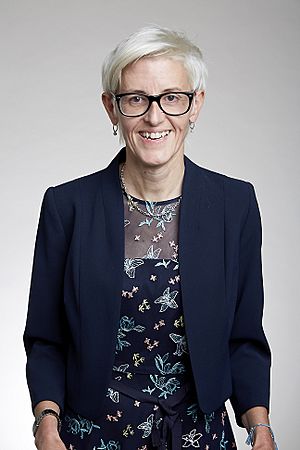Anne Neville (engineer) facts for kids
Quick facts for kids
Anne Neville
|
|
|---|---|

Neville in 2017
|
|
| Born | 1 March 1970 |
| Died | 2 July 2022 (aged 52) |
| Alma mater | University of Glasgow (BEng, PhD) |
| Awards |
|
| Scientific career | |
| Fields |
|
| Institutions | University of Leeds Heriot-Watt University |
| Thesis | An investigation of the corrosion behaviour of a range of engineering materials in marine environments (1995) |
| Doctoral advisor | Trevor Hodgkiess |
Anne Neville (March 1970 – 2 July 2022) was a brilliant engineer and professor. She held a special position called the Royal Academy of Engineering Chair in emerging technologies. She was also a Professor of Tribology and Surface Engineering at the University of Leeds.
Contents
Becoming an Engineer
Early Schooling and University
Anne Neville went to Maxwelltown High School in Dumfries. After that, she studied at the University of Glasgow. She earned her first degree, a Bachelor of Engineering (BEng), in 1992. Then, she completed her PhD in mechanical engineering in 1995.
An Accidental Path to Engineering
It's interesting how Anne became an engineer. She didn't plan it from the start! She saw a picture of a Rolls-Royce gas turbine in a university book. It looked really cool to her. Her maths teacher, who was a mechanical engineer, told her more about the field. After visiting the university's open days, she was completely hooked. She was almost going to study maths or physics instead.
What She Studied
For her PhD, Anne studied how different metals wear down and rust. This is called corrosion and tribocorrosion. She looked at stainless steels and other special metal alloys. Her work helped scientists understand how rust and wear work together.
Her Amazing Career and Research
Starting Her Research Team
Anne Neville was a mechanical engineer. She was especially interested in how materials interact and wear down. This is called tribology. Right after her PhD, she became a lecturer at Heriot-Watt University. She quickly started building her own research team. This team grew to 25 researchers over the next few years. She became a Professor in 2002.
Moving to Leeds
In 2003, Anne and her team moved to the University of Leeds. There, she led a new group called the Institute of Functional Surfaces (iFS). This institute had 70 researchers! They worked on projects for many different industries. These included medical, oil and gas, and car companies.
Groundbreaking Discoveries
Anne's research group made some very important discoveries. They were the first to measure how fast rust happens inside hip joint replacements. This was a big deal, especially when there were problems with metal hip implants. They used special tools to study surfaces. This helped them understand how parts are lubricated in machines and even in the human body. Anne retired from her position at Leeds in 2020.
Awards and Special Honours
Recognized as a Top Expert
Anne Neville received many awards and honours for her work. She was named a Fellow of several important engineering groups. Being a "Fellow" means you are a top expert in your field. She was a Fellow of the Institution of Mechanical Engineers. She also became a Fellow of the Royal Society of Edinburgh in 2005. In 2010, she was elected a Fellow of the Royal Academy of Engineering.
Major Awards
In 2011, she received the Royal Society Wolfson Research Merit Award. She also won the Leverhulme Medal in 2016. This award was for her work on how different surfaces interact. She showed how tribology (the study of friction, wear, and lubrication) and corrosion are connected.
Royal Recognition
Anne was given the OBE honour in 2017. This was for her great contributions to engineering. In the same year, she was elected a Fellow of the Royal Society (FRS). This is one of the highest honours a scientist can receive in the UK. She also received honorary degrees from Heriot Watt University and the University of Glasgow.
Her Thoughts on Engineering
Encouraging Girls in STEM
Anne Neville believed it was important to get more girls into engineering. She thought that from primary school, girls and boys should both be involved with technology. She wanted to make sure talented girls didn't choose other fields like science or medicine as they got older. Anne herself never felt discriminated against in her career. However, she noticed that the number of girls choosing engineering, especially mechanical engineering, wasn't growing fast enough.
Her Advice to Young People
Anne had some inspiring words for anyone thinking about engineering: "Male or female… go for it! You will have the time of your life. I can honestly say I love my job. As an academic in engineering I can do what I want in terms of research as long as I can raise the funds to pay for it. This is a real privilege. I have travelled the world, met some brilliant people and have had great fun. What else could you ask for in a job?"
Her Passing
Anne Neville passed away on 2 July 2022.
 | Victor J. Glover |
 | Yvonne Cagle |
 | Jeanette Epps |
 | Bernard A. Harris Jr. |

